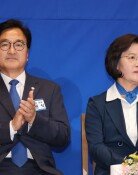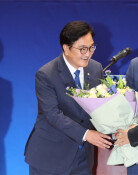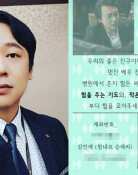Multi-level primaries
Five presidential hopefuls of the ruling Saenuri Party embark on their 30-day campaign Saturday for the party primary to elect its presidential candidate. When voting and polling results are announced on Aug. 20, the electorate will know who the party`s standard-bearer is. The public, however, remains in the dark over who will run for the opposition camp. The main opposition Democratic United Party is so obsessed about unifying the candidacy with other opposition parties that its presidential candidate will have to go through a candidate unification process with them.
First, the main opposition party will hold a preliminary primary July 29 and 30. Five of the seven runners who pass the first hurdle will compete in the main primary in 13 regions across the country from Aug. 25 to Sept. 16. But that is not all. The minor opposition United Progressive Party elected a new leadership after a vote-rigging scandal implicated two of its lawmakers, so the two opposition parties are showing signs of restoring their alliance. The main opposition partys candidate must compete against the progressive party`s nominee and Ahn Cheol-soo, a former software guru who is believed to have announced his candidacy through his book published Wednesday.
Such a multi-level competition is good for promoting a candidate by attracting public attention. As a party without a powerful runner, the main opposition party will prefer such a process. Given its open primary system, however, which allows non-party members to vote, there is a possibility that the candidates will be engaged in a heated competition to mobilize their supporters. Even if a candidate is elected through fierce competition, he or she will merely be a temporary candidate who must compete with Ahn again. Such a multi-level process will likely cost the contenders huge amounts of money, including state subsidies.
The later a unified opposition candidate is elected, the less time the electorate will have to examine him or her, making it likely that the presidential election will be a popularity vote rather than a competition of character and vision. If that is what Ahn has in mind, this is hardly a proper attitude toward the electorate. If he has learned about political maneuvering before entering politics, he will betray the publics trust in his image. If not, why would the spokesman of the main opposition party, Park Yong-jin, urge him to abandon his passive attitude of saying he had no choice but to run because of the partys poor performance? Will the party save face if it names a candidate who would beat Ahn through multi-level primaries?
Editorial Writer Kim Sun-deok (yuri@donga.com)







